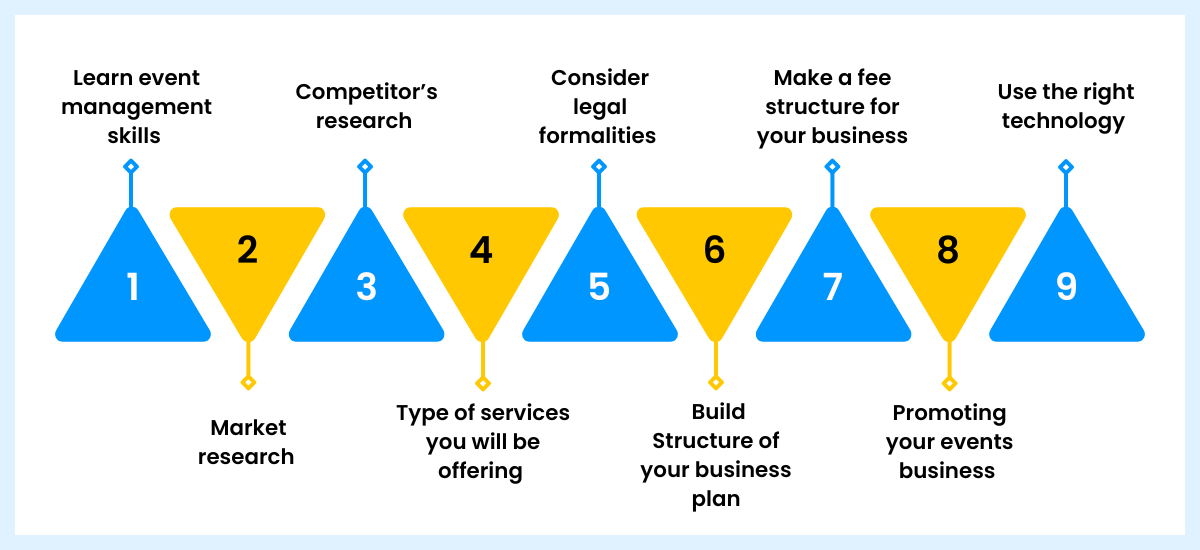- « Previous blog
-
Events
-
Apr 21, 2025
-
Apr 23, 2025
-
3115
-
0
- Next blog »
Do you want to start an event management business from home?
If you are reading this, you might be interested in starting up your own event management business from home. An events business involves a lot of planning and proper execution to be successful especially if you are starting it from home. Many people step back in this attempt as they don't know where to start. To help them all, we have come up with a detailed guide on how you can set up an event management business from home.

- Low cost:
- No travel related stress:
- Flexibility:
- Client meetings:
How to start an event management business from home: Detailed guide

1. Learn event management skills
No matter in which field you are going to start your business with, you must have a clear idea about it. Similarly, if you want to start your event business from home, you must know what it is all about. The path to establishing a business passes through many challenges and you must know how to overcome them. When it comes to an events business you need to have the right skills and experience to handle an entire event. Your clients would also rely on you based on your skills and experience. If you want to ace the event management skills you can:- Take up a course in the event management.
- Work as a volunteer or freelancer in an event.
2. Market research
It is essential for you to know if the kind of service you are offering in your event management business is in demand or not. Instead of having faith in your business idea, you must go out and do practical research to get the answer. Well, it might be a bit difficult as you need to consider various sources to see the real picture.- Talk to as many people as possible regarding the same.
- Find out public data, analysis and other reports.
- Try to interact with your target audience through phone calls or emails to understand the need of the service and more.
- Online research can also be very helpful here.
3. Competitor’s research
Once you are done with your market research, the next step is to conduct a thorough competitor's research to understand their business movements and activities. Consider the following things:- Identify your competitors first and find out the number of competitors present in your locality.
- Make a competitive study between your business ideas and their offerings. Do not forget to point out the similarities and differences.
- Communicate with a few of your competitors to know what are the challenges they are facing in this industry and what services are they lacking.
- Try to find the exact number of businesses that operate in your area.
4. Create the structure of your business plan
Having a solid plan will always help you in starting up an event business from home. It always keeps you in a better position to handle your company easily. You must start planning for your business even before giving it a proper name. Here are the things you need to include while creating the structure of your business plan:- Outline your company vision.
- Be specific about your company mission.
- Analyze your business strengths, weaknesses, opportunities and challenges.
5. Consider legal formalities
Whether you are planning to start a business from home or office, completing the legal formalities is crucial to avoid any sorts of legal troubles in the future. When it comes to the legal formalities of a new business two most important things are:- Giving a name to your business.
- Registering your company.
- Consider the type of service you are offering through your business.
- What is the uniqueness of your dream business?
- Find a name that is simple and easy to remember. Keep it short and crisp.
- Before finalizing a name, do not forget to check if the domain name is available on the web.
- Research and gather details about the actual process of business registration in your country.
- It is important for you to determine the basic pattern of your business. This includes determining the kind of legal entity you will be using to operate the business. You might be the sole owner of it or you have one or multiple partners and this has to be decided before you are submitting your application to the government. Make a research to find which structure will be beneficial for it.
- Assemble all the important documents that are needed to complete the formality.
6. Decide the type of services you will be offering in your event business
Another crucial part of building your own events company from home is to determine the type of event services you want to provide your clients with. The event industry is huge and contains an endless number of services. So as a business owner you need to decide if you have the strength or capabilities to offer all these services or you want to pick up a few from the list that you have a thorough knowledge of. For example, you can be a wedding planner or manage birthday parties or business meetings or conferences or more.7. Make a fee structure of your event management services
This is another important aspect of an event management business as you must know how you can earn through your business. The three most common and popular types of fee structure include the following.- Per hour charge.
- Flat fee and.
- Fees based on percentage.
8. Promoting your events business
Every business needs promotion, as you need to reach out to the maximum number of your target audience. The promotion method usually relies on the type of people you target for your business. However, you must utilize both online and offline methods of marketing your business. Online business promotion includes:- Creating a website.
- Creating social media pages.
- Email marketing.
- Adding your business to local business listing portals.
- Host a business launch party and invite everyone you know.
- Go for partnerships.
- Marketing through word of mouth.
9. Use the right technology
If you are planning to step up a business in the world of events make sure you have a striking online presence for your target audience. This is because your visitors can easily find all the details about your business through it. Adding event management functionalities to it is something that makes the entire process smooth and simple. Whether you are a beginner or you have already established your business, WP Event Manager adds the right ingredients to the success of your event management business. It is packed with some useful features that let you showcase your events through an interactive calendar, manage registrations, sell tickets, display event location through Openstreetmap, Google Maps and more. When it comes to an event management plugin, the market offers countless options to you. So what makes WP Event Manager better than them?- The features that WP Event Manager offers truly make it superior to others.
- It provides many powerful features for free to its clients.
- The paid addons are worth the price.
- Addons are very much affordable and they also offer plugin bundles that have made bulk plugins easily available to everyone.
- When we are talking about the strengths of WP Event Manager, we simply can not avoid its support system. They are sincere and always answer quickly for their queries and issues.
- It has also received several awards and recognitions that speak for their quality and credibility.
Frequently Asked Questions
1. How does it cost to start an event management business?
The cost of starting an event business from home depends on various factors. However, you might need around $600 to $1,200 to cover the initial cost.2. Is event management a profitable business?
Yes, with strategic planning and dedication, an event management business can be highly profitable for both freelancers and full-time event planners.3. How do event planners make money?
There are different price models based on which event planners make money. Some of these pricing structure include:- Flat fee system: event planners charge clients a fixed amount as their fee.
- Percentage of the total event budget: in this system, event planners charge a fixed percentage of the total budget of their clients.
- Hourly payments: many event planners set their cost on the basis of the hours they have spend on planning for a specific event.
- Commission based payment: some planners may also opt for earning a percentage of the fees that are spent on vendors and other service providers.
 Use coupon code:
Use coupon code:  Something exciting is coming soon – stay tuned to find out! 🚀✨
Something exciting is coming soon – stay tuned to find out! 🚀✨
